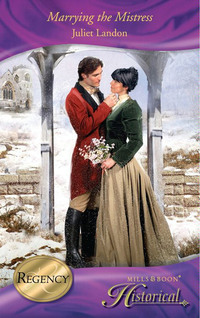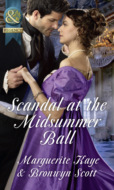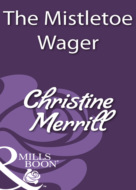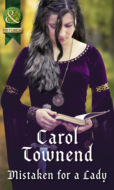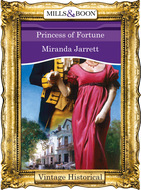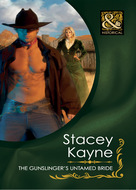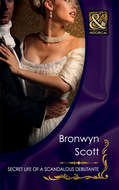Raamatut ei saa failina alla laadida, kuid seda saab lugeda meie rakenduses või veebis.
Loe raamatut: «Marrying the Mistress»
‘Dance with me,’ he whispered.
My eyes must have reflected my doubts, but he did not accept my refusal. Standing abruptly, he held out a hand and raised me to my feet, leading me like a sleepwalker into the ballroom, where we joined the end of the line, moving into the steps as we went, turning, parting, closing, balancing.
If there were stares of disapproval neither of us noticed, only the slow and stately steps that moved us apart and together again, our bodies and hands just touching, like those six years condensed into six minutes. His eyes were brazen with desire, and mine were speaking of I know not what, except too much of my feelings. I knew then that I was losing control, that I was showing him what was in my secret heart, because, with his outspoken talk of wanting me, he had found a way in.
Juliet Landon’s keen interest in art and history, both of which she used to teach, combined with a fertile imagination, make writing historical novels a favourite occupation. She is particularly interested in researching the early medieval and Regency periods and the problems encountered by women in a man’s world. Her heart’s home is in her native North Yorkshire, but now she lives happily in a Hampshire village close to her family. Her first books, which were on embroidery and design, were published under her own name of Jan Messent.
Recent novels by the same author:
ONE NIGHT IN PARADISE
THE WIDOW’S BARGAIN
THE BOUGHT BRIDE
HIS DUTY, HER DESTINY
THE WARLORD’S MISTRESS
A SCANDALOUS MISTRESS* DISHONOUR AND DESIRE* THE RAKE’S UNCONVENTIONAL MISTRESS*
*Ladies of Paradise Road
Author Note
Madame Helene Follet, High-Class mantua-maker and milliner of Blake Street, York, would have kept records and notes of what she bought, designed and sold, the colours, sizes and weights, and price per yard. Such notes would have been packed into a book amongst snippets of velvet, calico and silk, lace and ribbons, pinned in tiers or wound around cards thick enough to prevent the book from closing properly.
As an embroiderer, I could not resist making one for her using a method known nowadays as ‘altered books’. For this, I took an old book with hard covers that I no longer wanted and removed many of the pages with a sharp craft knife, leaving about 2 cms next to the spine. On these attached strips I stuck prettily-patterned replacement pages. Then I did what Helene would have done, packing each substitute page with Regency details, letting ribbons hang, arranging pages by colour, drawing hats and bonnets, cutting out pictures from brochures and postcards, sticking on scraps of fabrics that Helene would have known, stripes, florals, tiny prints and glittery bits. Papers can be bought from craft shops for the purpose. Just cut, arrange, pin and stick. I should warn you, it can become addictive.
To finish, it is usual to re-cover the original backing (i.e. the covers) with a suitable heavy duty paper that complements the interior.
MARRYING THE MISTRESS
Juliet Landon
MILLS & BOON
Before you start reading, why not sign up?
Thank you for downloading this Mills & Boon book. If you want to hear about exclusive discounts, special offers and competitions, sign up to our email newsletter today!
Or simply visit
Mills & Boon emails are completely free to receive and you can unsubscribe at any time via the link in any email we send you.
Prologue

York—April 1802
It was hardly more than two miles from the centre of York to the racecourse at Knavesmire, a distance that only a few months ago, the Honourable Linas Monkton would have been happy to ride on horseback without the least discomfort. On this occasion, however, his young mistress, Miss Helene Follet, had put her foot down and ordered the barouche to be made available, for nowadays Linas’s cough left him weak, sweating with pain and gasping for breath. She dared not allow it, although she would have liked to ride her own black mare that weekend.
‘I feel sure we’re in for some showers,’ she said, noting the bending tree-tops as they passed out of Micklegate, ‘and I don’t fancy getting soaked as we watch your brother’s horses go through their paces. If it turns out fine, I’m sure he’ll lend us two of his hacks to ride. Did you remember to pack the new linctus?’
‘I expect Nairn did. You look very nice, my dear.’
Linas’s compliments rarely went beyond ‘nice’ or ‘smart’, which Helene thought more appropriate for soldiers. ‘Thank you.’ She smiled. She had made the outfit herself, including the beaded panel down the front and the frilled chemisette that showed inside the neckline. The matching bonnet of ruched blue-grey silk had been made by her, too, after the latest French styles.
Linas himself ought to have been tucked up warmly in his Stonegate home on such a raw April day, but it was the start of the York racing season and nothing would have persuaded him to refuse his twin brother’s invitation to stay the weekend at Abbots Mere, so close to the racecourse. The invitation had been to stay for a week, but Helene had balked at that and Linas, aware of a certain tension between his mistress and his brother, had not insisted on more than two nights.
Helene would rather not have gone at all. Although she enjoyed the races and the sight of horses in a herd at full gallop, bright with silks and shine, she could not look forward with anything like the same enthusiasm to meeting the Abbots Mere set, which, as like as not, would include a similar herd of Lord Winterson’s mistresses, past, present and hopeful.
The twins were unlike each other in most respects, Linas being far from robust but still trying to emulate his brother in so many ways, by taking a mistress, for instance, and by trying to prove his fitness when it was plain to see, to Helene at least, that he grew weaker with each passing season. Lord Winterson’s rude health needed no proof, for one look at his powerful physique was enough to convince any critic that his parents’ recipe had favoured the first of the two to emerge with good looks, intelligence, and enough charm to ladle out whenever he felt he could spare the effort. At other times he could be insufferably proud and offhand, and it was said that one of Winterson’s set-downs could cause a recipient’s disappearance for as long as a six-month.
Linas had never indulged in that kind of high-handedness except occasionally to the servants, and it was this brand of gentle courtesy that had won Helene over. After insisting that she would never again become intimate with a man for money, however high-born, she had relented and become Linas Monkton’s mistress, companion and nurse. That had been two years ago when she was still seventeen, two years in which there had been no sign of pregnancy, in spite of her desire to bear his child before it was too late.
Perhaps it was already too late, for Linas had not visited her bed once in the last two months on the pretext that any physical exercise brought on his coughing spasms. Tomorrow would be her nineteenth birthday. She hoped he might visit her, if only to be held in her arms.
It was unproductive to speculate on the welcome they would receive, Helene having no reason to suppose that they would be treated with anything but courtesy and, in her lover’s case, with affection too. The brothers were very fond of each other, and although no obvious favour was offered to Linas when taking part in the usual manly activities, Helene nevertheless suspected that Lord Winterson kept a very careful eye on his brother, stopping within his limits or suggesting an easier route, ostensibly for his own benefit. Visiting Linas’s home on Stonegate, Winterson never stayed long enough to tire him, nor was anything ever said in her presence about the array of medicines at Linas’s elbow.
Helene hoped it was obvious to Winterson that she was taking every conceivable care of his brother without molly-coddling him, but the feeling persisted that he thought her a young social-climbing nobody on the look-out for a wealthy patron who would feather her nest for as long as possible. If he had taken the trouble to find out, she thought, he might have discovered the truth of the matter, that Miss Helene Follet was in fact a certain Miss Helen Follethorpe of Bridlington, only thirty miles or so away on the Yorkshire coast, where her father had once been mayor. Had it not been for Leonard Follethorpe’s unfortunate experience, she would still be living with her family in comfort instead of selling herself to support those of her family who remained. Five years ago, taking a lover had been the very last thing on her mind, but she could be of little help to her family on the pittance she had earned as a York mantua-maker’s assistant, and one could not be too finicky when near-starvation was a real alternative.
To say she resented Winterson’s thinly veiled contempt would not have been an exaggeration. His manner was correct and as icy as if she’d been a crusty old dowager of fifty instead of a sleek raven-haired beauty of nineteen, giving her no opportunity to be as sisterly as she was with her own two young brothers. Not even for Linas’s sake did Lord Winterson do anything to endear himself to her, and now as he strode out of the great Tudor porchway of Abbots Mere with three gigantic wolfhounds at his heels, his smile skimmed over her as if she were merely the housekeeper or Linas’s nurse. The hand he extended came just a little too late to help her out of the barouche.
‘Miss Follet,’ he said, keeping the hand out so that she was obliged to accept it. ‘Welcome to Abbots Mere.’ The greeting was formal, and not particularly convincing.
She had tried to ignore the ambiguous emotions that bedevilled her, but the contrast between Linas and his twin was so transparent, and she herself so receptive to all the differences between one man in the prime of his life and one whose prime had never quite materialised, that she now found it easier to accept it than question it. Winterson did not have his brother’s lanky loping frame of a tired racehorse, but the deep-chested, well-toned solidness of a hunter.
Helene watched him move gracefully aside, her eyes taking their own wayward course over the broad smooth line of his riding coat, the bulge in his tight breeches, the tan-cuffed riding boots with spurs, and the muscled calves. Reprimanding herself, she refused to acknowledge the stark truth that she might have wished this man’s physical endowments upon his sibling, forcing herself instead to smile at the brotherly embrace and the genuine laughter accompanying it. The stifling, insistent beat of her heart, so long starved of its own special excitement, was quelled with some effort as she diverted her thoughts towards Linas’s pleasure and what she could do to maintain it.
Noting how Linas caressed the ears of the nearest wolfhound, she could see how happy he was to be here and to spend time in the stone-built rambling place where he’d been born. As a concession to his asthma, he kept no animals except horses, but any excuse to visit his brother’s racing stable was worth the sneezing fits and the itchy rash on his wrists that Helene cooled with witch-hazel and chamomile. The prospect of sleeping in his old room at Abbots Mere brought back the laugh lines to his pale winter face and lit up the sombre darkness of his eyes, as did the appearance of Somerton, the elderly butler.
Linas took Helene by the hand. ‘Good to see you again, Somerton,’ he said, creasing his papery skin with deep folds.
‘And you also, Mr Linas, sir. M’lord Burl here has had us all up since dawn to get everything ship-shape. We’ve even polished the hounds’ collars. Welcome, Miss Follet,’ he said to Helene, courteously.
‘Thank you, Mr Somerton.’
Perhaps being made aware by his butler that something more was being required of him, Winterson turned back to her to offer his arm, taking both her and Linas through a panelled passageway into the Great Hall. Again, the differences returned with the memory of that first meeting at the York Assembly Rooms when they had danced together just before she and Linas had first met, when she had seen the fear in Linas’s eyes that she would surely prefer his brother Burl, as any woman would. But she had never been seriously attracted to men like Winterson with reputations for breaking hearts, nor could she afford the indulgence of falling in love. If Winterson had ever suspected that she was more interested in a long-term relationship, then he would have been correct. She was. But her affection for the Honourable Linas Monkton was none the less genuine, for all that, and her good care of him had grown into a kind of love far beyond convenience.
The company that weekend was exactly as Helene had expected it to be, noisy, good-natured and gossipy, flirtatious and with an air of competition she felt no need to be a part of, since she was unavailable. Not that she was entirely safe from the attentions of the men, but her status and devotion were sufficient to keep all dalliance at a very superficial level. And because she posed no threat to the women, they sought her friendship and asked her advice about even the most personal matters, especially about fashion. Yet they were not the kind of people she would have chosen to spend a weekend with, and she wondered why Lord Winterson enjoyed their company so much, unless it was to watch them compete for his attention.
Although Winterson must have known about Helene’s previous employment as a seamstress, she had told neither of the brothers the full story of her transformation from well-brought-up mayor’s daughter to mantua-maker’s assistant. If either of them ever wondered how she had acquired such singular style and elegance, how she came to be fluent in French, or why she spoke English with only the odd vowel sound to betray her northern roots, they were either too uninterested to ask, or too well bred.
But the mantua-maker herself, once she saw what a gem she had taken on, had put those accomplishments to good use, transferring her from the workroom to front of shop, using her as a mannequin to model her creations and to suggest other ways of using accessories and fabrics with the kind of flair the older woman could only dream of. When Helene borrowed an evening dress now and again to attend the nearby Assembly Rooms with a beau, this was seen as a cheaper way of rewarding her than with money, for she was sure to tell admirers where such a beautiful gown could be made. Those years had been for Helene a time of intense learning in which she had absorbed every skill of the dressmaking trade, since then she had designed and made all her own garments, including her bonnets.
Despite her undeniable fashion ability, her popularity with Winterson’s guests could not be called complete as long as Lady Veronique Slatterly was on hand to shoot down any woman perceived to be receiving more than her fair share of attention from the men, particularly from Winterson himself. Her envy of Miss Helene Follet was out of all proportion to her influence with anyone except Linas. But according to Lady Slatterly, Helene was almost one of the family whereas she herself had not yet achieved that status, nor had she any guarantee of success. Helene’s superior position was too close for comfort, and the consequent trivial and ungenerous remarks that Lady Slatterly rained upon her, almost unceasingly, eventually drew even mild Linas’s displeasure at dinner.
Handing Lady Slatterly a silver dish of sugary things, he told her, ‘Take a few, Veronique dear. Chew them slowly to grind your teeth down.’
Frowning, she took the dish from him. ‘What are they?’ she said.
‘Little sweet things, dear. Keep them by you. You need them.’
Damned if she did, and equally damned if she declined, she glared at Linas as everyone around them laughed, but the caustic remarks stopped for the rest of the evening.
This personal sniping would not in itself have caused Helene too much concern had she not already been feeling vulnerable, vaguely insecure and unsettled by not knowing how to relate to a host who treated her with such polite indifference as if it was no possible concern of his that she was caring so well for his ailing brother. As if she was doing it more for her own benefit, rather than his. Not that she expected their undying gratitude at every end and turn, nor even their thanks. Men only rarely went in for that kind of appreciation. But nor did she appreciate being taken for granted in the offhand way these brothers had. Linas was a very dear man, but he appeared to suppose that what Helene was doing for him was no more than he deserved after what he was doing for her. And since the question of the future was a subject he particularly wished to avoid discussing, it seemed not to occur to him that Helene would have benefited from some clarity on the issue. She had a house, servants, a horse and enough money to pay her bills, but presumably those would all disappear one day, unless she could make some other arrangement.
Had relations between Helene and Lord Winterson been more cordial, she might have broached the subject to him. But not the way things stood. There was a younger brother who also lived on the outskirts of York, a new country parson named Medworth whose profession and family kept him totally occupied. No doubt he was relieved to know that his brother was being cared for, but his absence showed that he had his hands full enough without involving himself in Miss Follet’s problems.
Mindful of Linas’s enjoyment, Helene made every effort to enter into the excitement of the first day, during which two of Winterson’s racing thoroughbreds were competing. The day had begun with an earlier-than-usual breakfast and, since the weather was blustery but dry, Helene and Linas borrowed two of his brother’s hacks to ride with the others, she in her habit of nutbrown velvet and matching plumed hat that drew many a compliment. Linas had retired early the previous night, well before the others, and had fallen asleep even before Helene could go in to wish him goodnight. His valet had told her that his master had been too tired even to take his usual night-cap of port, sharing with her a look of concern that did not bode well for the busy day ahead.
So it did not surprise her that no reference had been made to her birthday on the morrow, and it seemed to her inappropriate to mention it when all the attention was focused on the races, the guests, the winners and owners, the sumptuous feast, the meeting of old friends and the excitement of Winterson’s successes. Linas had completely forgotten, and Helene had already decided that his guilt would serve no good purpose. Even so, there were moments during the day when her lovely expressive eyes must have revealed something of her hurt and disappointment, the ache to be at home with her family on this special day, enjoying their warmth and love instead of maintaining a position for which she had no real appetite, which she would once have reviled before she lost her innocence.
Turning to look at Linas, she checked that he was comfortable on the well-mannered hack, heaved a sigh, and looked away into the distance to where the newly white-painted grandstand swarmed with racegoers. A large horse and rider moved up beside her, blocking her view of Linas. It was his brother. At first his eyes followed where hers had been and then, returning to find that she was looking down at her hands as if deliberating whether to go or stay, said, ‘No, don’t go. We have not spoken all day.’
‘To each other, you mean? What is there to be said, except congratulations?’
‘Oh, dear. You’re angry.’ His voice was deep and apologetic.
‘Not at all. But you must not be seen talking to me, my lord. That would look very odd, wouldn’t it? See, we’re being remarked already.’
‘What is it, Miss Follet? You are angry. With me? Linas? Has he been flirting with someone?’
‘I don’t know what he’s doing. Does it matter?’
His horse stretched its neck, pulling his hand forwards as it shook its head and jangled its bit, keeping its rider occupied with its sidling before he brought it back, almost touching her leg with his. She watched as he humoured the great beast with patience, as if he enjoyed controlling its movements, his face strong, impassive, astonishingly regular, for a man. His dark hair was too long, she thought, noting how it curled over his cravat at the back. He had obviously been thinking of what she said. ‘Or what he’s not doing? Is that it? He’s forgotten your birthday?’ he ventured.
She knew it to be a stab in the dark. It must be. Yet the sudden surprise in her velvet-brown eyes escaped before she could hide it, and the denial that followed was worse than useless. ‘Of course he hasn’t. He…’
‘He has, hasn’t he? He was never any good at birthdays, Miss Follet. He rarely remembers ours, either. Shall I remind him for you?’
‘No!’ The word shot out, compounding the earlier denial. ‘No, please don’t.’
‘Ah! You mean you’d rather remind him yourself in a week’s time? Or you’d rather he didn’t know at all?’
‘I mean, my lord, that it’s of no possible concern to anyone but me. Please say no more about it.’
‘If that’s your wish, then I must obey. But you’re wrong to think it concerns only you. You are my guest and you’re not entirely enjoying the experience. That concerns me. What can I do to put it right?’
‘Nothing at all. Your hospitality is the finest, and if Linas is content then that is all I ask for.’ She heard the emptiness of her reply and was not proud of its insincerity. She could hardly expect him to believe her.
‘Fine unselfish sentiments, ma’am. But I fear I’m too cynical to be taken in by them. To say that my brother’s contentment is all you desire, a woman of your age, is moonshine. Have you not thought ahead a little, to the time when you might wish for more?’
Like a ball of slow fire, a sob of pain rose into her throat to sear her with a longing so intense that she had once cried out in the night with it, soaking her pillow with tears, for it seemed at times that her thoughts were of little else. Before she could take herself in hand, her eyes had begun to flood with scalding tears, showing him what was in her heart as clearly as if she held its doors wide open. This man, of all men, to see her weakness, a man who had rarely condescended to speak to her until now.
She would have wheeled her horse away, blindly, but he caught at her bridle before she could do so, leading it away from the Abbots Mere crowd towards a deserted area of long grass where both mounts dropped their heads to snatch at a juicy mouthful. He held her reins and waited, keeping their backs to everyone but making no comment.
‘I’m all right,’ she whispered. ‘Do forgive me. I had no wish to embarrass you, my lord.’
‘I am not in the least embarrassed, Miss Follet. I tend to be outspoken, and I have touched a raw spot. I am concerned, but not embarrassed.’
‘Yes, my lord, you have. Shall we say no more about it, if you please?’
‘Of course. Are you quite recovered?’
‘Yes. Quite.’
‘Then we shall return.’ Handing her the reins, he took stock of her smooth curvaceous lines under the habit, the neat waist and long back, the white lace at her throat. Black glossy hair was bundled into a gold net under her saucily feathered hat, and the deep reproachful eyes spiked with long black lashes were like pools to drown a man. Her full lips were mobile upon a skin of peach that he knew his brother had begun to abandon as his illness progressed and that this, as much as anything else, was a prime source of her distress.
Their return to the others, side by side, did not escape the notice of Lady Veronique Slatterly, whose displeasure bordered on extreme folly. ‘Where have you two been?’ she demanded, wheeling her grey mare round in circles ahead of them. Her blue eyes were cold and hard upon Helene.
Winterson’s reply did nothing to thaw them, though her skin turned a healthy pink. ‘I have not had to account for my whereabouts since I was fourteen, Lady Slatterly, and I don’t intend to start again now. Nor, I imagine, does Miss Follet owe you an explanation.’
Snubbed in no uncertain terms, the astonished woman hauled her mare savagely away and, though Helene caught sight of her several times during the afternoon, she did not approach.
It was Linas himself who answered Helene’s query about the exact nature of Lady Slatterly’s relationship with his brother. Was she his mistress, or merely one of the hopefuls?
‘He has no official mistress,’ Linas told her on the way back to Abbots Mere. ‘Veronique believes she stands a good chance, but she’ll have to toe the line and curb her sharp tongue if she wants to get anywhere with Burl. He doesn’t like the controlling kind of woman. Not even our mother had much success there.’
The parents, Lord and Lady Stillingfleete, had never exercised much control over any of their three sons, and had left the family home at Abbots Mere to live in a smaller Georgian house in Harrogate, within reach of the healing baths. Their large estate was now in Winterson’s capable hands, visited only once or twice a year by the owners when they wanted a change of scenery.
* * *
As a result of Winterson’s reprimand, Lady Slatterly’s rudeness seemed to abate on the second evening, giving Helene some respite from the woman’s jealousy. It also seemed to Helene that Winterson’s manner had changed too, even if she was the only one to notice that, this time, he took part in her conversations instead of distancing himself, showing more of an interest in her well-being.
Linas was exhausted after missing his afternoon rest, and at dinner Helene could see how he fought against his fatigue. Not wishing to prevent him from drinking more wine than usual while so many were there to see, she was obliged to watch in dismay as his glass was refilled time and again. His speech began to slur, and his pale skin became unhealthily mottled.
Unable to hide the concern in her eyes, she found her looks intercepted by Winterson’s equally worried frown. It was getting late, yet no one had deserted the gaming tables or the chatting groups arranged on couches and floor cushions. She shook her head at the young footman holding a tray of filled glasses in front of Linas, but too late to prevent one being removed, clumsily, sloshing the contents over white knee breeches and carpet.
She went to him, hoping to offer some unobtrusive help, but Winterson was there before her, lifting his brother under each armpit and good-naturedly ignoring his protests. ‘Come on up, old chap. Enough for one day.’
‘Stay with your guests, my lord,’ Helene said. ‘I’ll go up with him.’
‘No, you stay here. I’ll see to him myself. Nairn is on his way.’
‘He’ll be at his supper.’
‘I sent for him. Lespeaking ave him to us.’
His commands offered her a certain comfort for, although she had not wanted to stay amongst the guests for much longer, the alternative was even less appealing. To hand control over to his authoritative twin would be no great sacrifice.
She stayed in the drawing room for another hour, managing to convince all except one that she was as light-hearted as the rest of them. Winterson reappeared to lead a silly game of charades, but the pace slackened and, two by two, the ladies withdrew to their rooms to prepare for the night, still giggling and flirting. Helene was relieved that she and Linas would be returning to York in the morning. She would leave him at his spacious Stonegate home to rest and recover, and she would go to her well-ordered house on Blake Street, which was not really hers but Linas’s. She would pretend to be its mistress when the reality was that she could stay only as long as Linas was alive.
If she could have given him an heir, her future would be more assured, but that was unlikely to happen, for both of them had realised some time ago that one of them must be infertile. Having as much pride as he, Helene preferred to believe that the fault must lay with him, but Winterson’s wounding enquiry about her future had inflamed a painful truth that was never far from her darkest thoughts that, no matter which of them was responsible for their childlessness, the outlook remained bleak.
Deep in thought, she allowed her maid to undress her and to lock away the few jewels Linas had given her since their first Christmas together. He had never thought it necessary to shower her with gifts, but now her birthday had come and gone without a word, and the thought re-occurred yet again that their relationship must be on the wane. Ought she to leave him now, before he did? Should she find another lover, and be passed from one to the next until…until what? Had his brother anticipated the end of the partnership? Was that another reason for his coolness?
With a pang of guilt, she decided not to go to Linas’s room, knowing how the scene would do nothing to lighten her spirits. His brother and valet had tended him, and now he would be snoring heavily under a mountain of extra blankets with all the windows tightly shuttered and a lamp left burning next to the mahogany commode. The air would be heavy with the odour of medications and sweat. It was no place for lovers.
For a few moments longer she watched the rain beat upon the night-blackened window and run down the glass, parting and joining, lashed sideways by fitful gusts of wind. Then, drawing the curtains to shut out the sight of her distorted naked reflection, she parted the cool sheets and slipped between them, gasping at the sting of freshness upon her skin, her feet seeking the places where the warming-pan hadspeaking recently been. The maid tiptoed across to the candlestick and blew out the flame, leaving her mistress to her rest.
Tasuta katkend on lõppenud.

